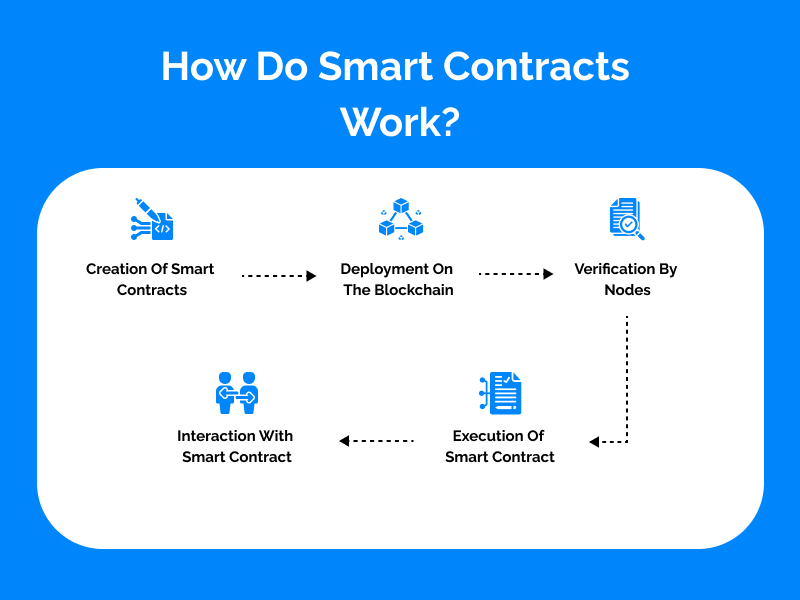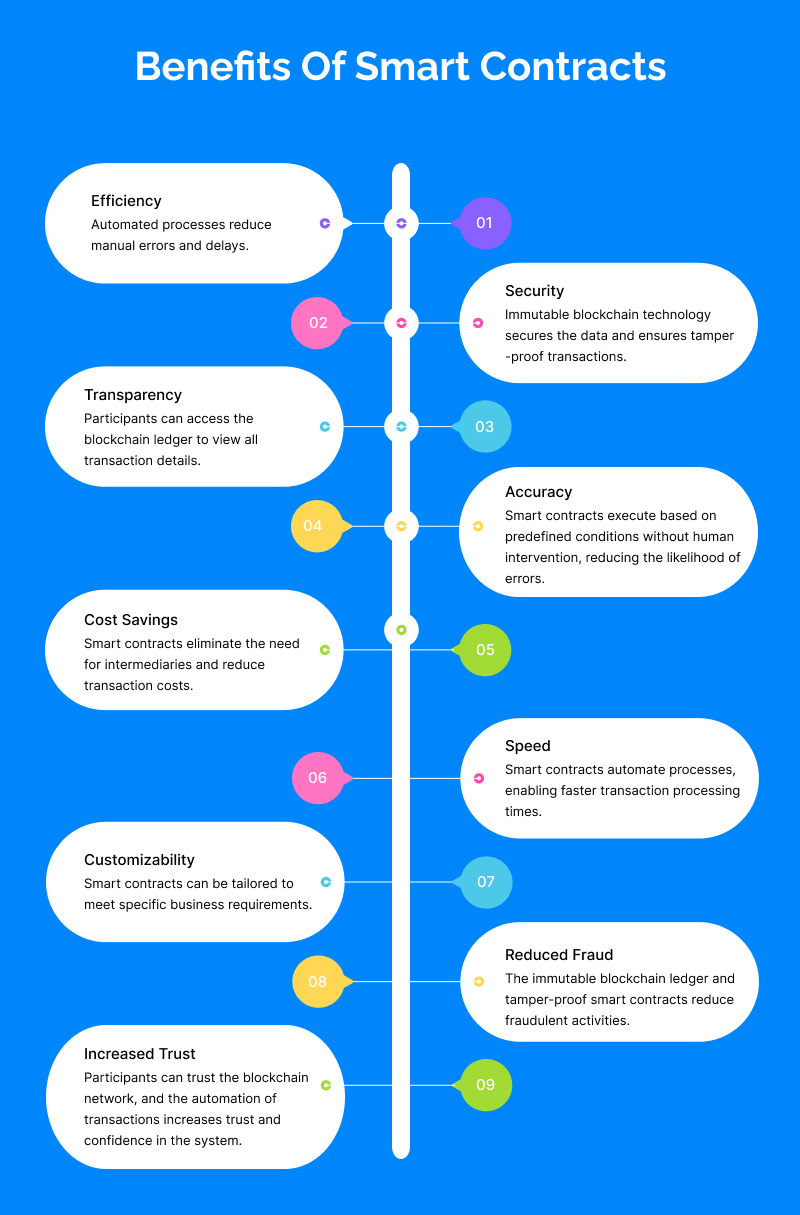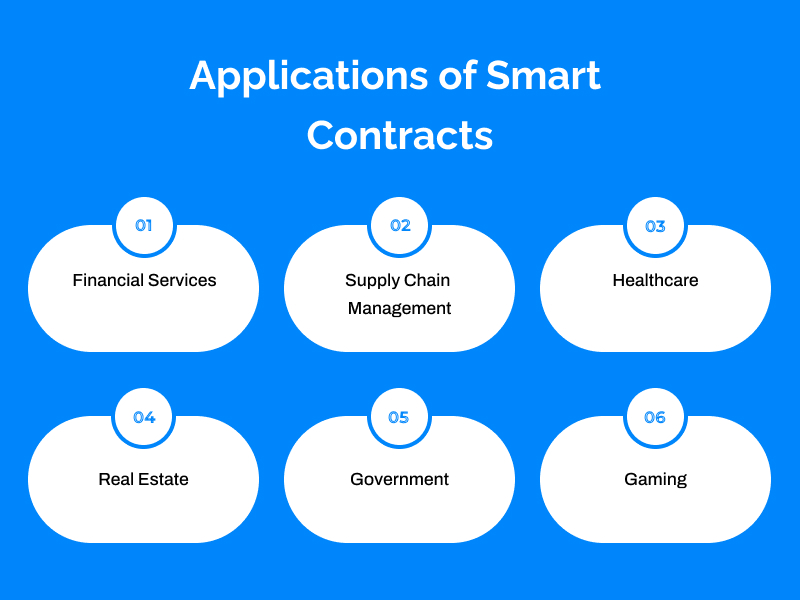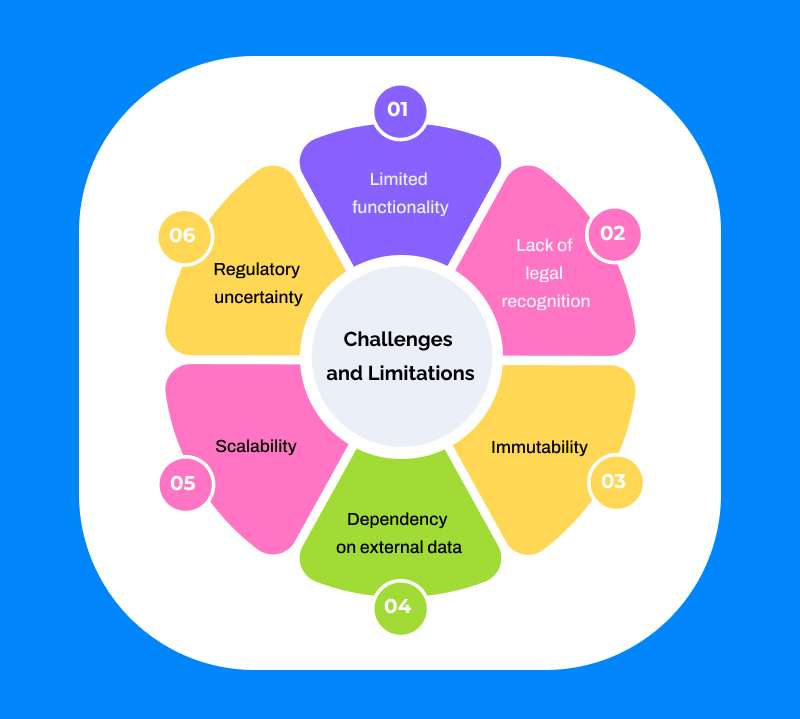In recent years, “smart contracts” has become a buzzword in the blockchain industry, and for a good reason. According to Future Market Insights, the smart contracts market revenue that was USD 150.2 Million at the end of 2021 is expected to reach USD 1,515 Million by 2023, growing at a CAGR of 23.5% from 2022 to 2032.
So, what could be the reasons for predicting such a sharp growth in smart contracts revenue within two years? In this blog post, we’ll explore the world of smart contracts, their benefits, applications, and how they build secure and efficient automated systems with blockchain solutions.
What Are Smart Contracts On Blockchain?
These self-executing contracts not only eliminate the need for intermediaries but also offer unparalleled security and efficiency in automating complex business processes. With the power to revolutionize industries ranging from finance to healthcare, blockchain smart contracts have emerged as a game-changing technology to transform how we conduct business.
Also Read: All About Blockchain Technology: Meaning, Types, Benefits & Much More
How Do Smart Contracts Work?
Smart contracts are created using programming languages, such as Solidity, specifically designed for the Ethereum blockchain. These contracts are stored on the blockchain network and executed automatically when certain conditions are met. It is a new and innovative way of automating complex business processes. They follow simple “if/when…then…” statements written into code on a blockchain.
Transform your business with our secure and innovative blockchain solutions
The process of creating and executing a blockchain smart contract is as follows:
Creation of Smart Contracts
A developer must write a smart contract in the initial stage. The contract outlines the terms of the agreement, the parties involved, and the circumstances under which it will be carried out.
Deployment On The Blockchain
The blockchain network deploys the contract after it has been formed. This is accomplished through the use of a transaction that broadcasts the contract to the network. The blockchain provides a decentralized marketplace and tamper-proof log of all smart contract transactions.
Verification By Nodes
When the contract is broadcasted to the network, nodes on the blockchain network verify the contract’s validity. They check the contract’s syntax and ensure it meets the network’s standards.
Execution Of Smart Contract
After the contract is verified, it is added to the blockchain storage or network and becomes immutable. The contract is executed automatically when the predefined conditions are met.
Interaction With Smart Contract
Users can interact with the smart contract by sending transactions to it. The contract will execute automatically based on the rules defined in the contract.
Creating a smart contract involves establishing the terms by determining how transactions and their data are represented on the blockchain development services, agreeing on the “if/when…then…” rules that govern those transactions, exploring all possible exceptions, and defining a framework for resolving disputes. Organizations that use blockchain for business increasingly provide templates, web interfaces, and other online tools to simplify structuring smart contracts.
In this video, we explore the concept of smart contracts, how they work, their benefits, applications, and the challenges and limitations they face.
Also Read: Cloud Computing Vs. Blockchain Technology: Which Is Right For Your Business?
Benefits of Smart Contracts
Some of the benefits of blockchain smart contracts include the following:
Efficiency
Smart contracts may automate intricate business procedures and eliminate middlemen to speed up and lower the cost of transactions. This results in a more efficient and streamlined process.
Security
These are stored on a decentralized marketplace, making them virtually impossible to hack or alter. This provides unparalleled security, which is crucial in today’s digital landscape. ValueCoders’ developers have expertise in blockchain technology and can help businesses implement smart contracts to enhance their security measures.
Transparency
Participants in a blockchain network can view all transaction details by accessing the blockchain ledger. This provides a transparent and immutable record of all transactions, ensuring that all parties have access to accurate and trustworthy information.
Accuracy
Smart contract crypto is executed automatically when predefined conditions are met, ensuring accuracy and reducing the risk of errors. This is especially beneficial for businesses that deal with vast volumes of transactions.
Cost Savings
By eliminating intermediaries, smart contracts can significantly reduce transaction costs. This is particularly beneficial for businesses that operate globally and deal with multiple currencies.
Speed
The next benefit of blockchain smart contracts is that they are automatically implemented without operator intervention, leading to quicker transaction times. This is essential for companies operating in sectors like banking and healthcare where time is necessary.
Also Read: Top Blockchain Development Companies To Improve Your Business Efficiency
Customizability
Smart contracts may be modified to meet the particular requirements of a business or sector. When you hire blockchain developers from ValueCoders’, they have expertise in creating customized smart contracts for businesses across various industries, such as healthcare, finance, and logistics.
Reduced Fraud
Smart contracts are tamper-proof and cannot be altered, reducing the risk of fraud. This is critical for businesses that deal with sensitive information or transactions.
Increased Trust
Smart contracts are accurate, safe, and transparent, which promotes confidence between parties. Businesses that operate in sectors like banking and healthcare, where trust is essential, would notably benefit from this.
Therefore, blockchain smart contracts offer numerous benefits to businesses. ValueCoders’ expertise in blockchain technology and smart contract development can help businesses leverage these benefits and improve their operations.
Transform your business with our secure and innovative blockchain solutions
Applications of Smart Contracts
Smart contracts are used in various industries, including finance, healthcare, logistics, and more. Here are some of the applications:
Financial Services
Smart contracts may automate financial operations like insurance claims, loans, and payments, cutting down on the time and expense associated with the procedure. This may lead to a more effective and safe financial system. The experts at ValueCoders can provide blockchain consulting services to help businesses implement smart contracts in their financial operations.
Supply Chain Management
Smart contracts can track items at every stage of the supply chain, guaranteeing accuracy and transparency. This can improve supply chain effectiveness and lower the risk of fraud. ValueCoders’ developers can create customized smart contracts for logistics and use blockchain for supply chain management businesses.
Healthcare
Smart contracts can also properly and securely store and distribute medical records, lowering the possibility of mistakes and enhancing patient privacy. This may lead to a more effective and secure healthcare system. ValueCoders’ developers can offer software consulting services in healthcare technology and help businesses implement smart contracts in their healthcare operations.
Real Estate
Real estate transactions may be automated with smart contracts, which reduces the time and expense associated with them. A more effective and safe real estate system may arise from this. ValueCoders’ developers can offer blockchain development services to create customized smart contracts for businesses in the real estate industry.
Government
To ensure accuracy and transparency, smart contracts can also be utilized in public records, voting systems, and identity verification. This may lead to a more effective and secure governing system. ValueCoders’ developers have expertise in blockchain workflow management that can help governments implement smart contracts in their operations.
Gaming
Smart contracts can also help create a decentralized marketplace for gaming platforms, ensuring fairness and transparency in the gaming process. This can result in a more efficient and secure gaming system. ValueCoders’ developers have expertise in gaming technology and can help businesses create decentralized gaming platforms using smart contracts.
Overall, blockchain smart contracts have numerous applications across various industries. ValueCoders’ expertise in blockchain technology and smart contract development can help businesses leverage these applications and improve their operations.
Also Read: Blockchain: The Game-Changer To Radically Transform Your Business [White Paper/PDF]
Smart Contacts Solutions offered by ValueCoders
“One of our reputed clients that owns a crypto-rewarding app and deals with travel, whether public transport or holidays, contacted us to design and develop an app that grants exclusive access to customers to grow holdings of the new digital currency, ‘Diginaro’. This mobile app should allow customers to transfer their earnings and exchange them for their local currency with just a tap. The app is designed for those who love to travel because the more you are on the move, the more money you earn! Also, it is an eco-friendly and forever-free wallet and reward app. Customers don’t need to spend money to earn with the PayTrip app.”
The client’s challenges were hosting the admin panel, searching and pagination, crashing on 404 and 503 API errors, and implementing in-app notifications at regular intervals. We helped them resolve the challenges using blockchain, cryptocurrency, MongoDB, Nodejs, and Reactjs.
You can get complete details of the project Forever Free Wallet And Reward App on the website.
Transform your business with our secure and innovative blockchain solutions
Challenges and Limitations
Although Blockchain smart contracts come with many advantages, they have certain limitations and restrictions. Here are some more prominent ones:
Limited Functionality
Smart contracts can only execute the functions programmed into them, limiting their functionality. Complex business processes may require multiple smart contracts to be executed simultaneously, which can increase the system’s complexity.
Lack Of Legal Recognition
Blockchain smart contracts are not legally binding in many countries, which can limit their usefulness. Sometimes, they may supplement traditional legal contracts but cannot replace them entirely.
Immutability
They are immutable once deployed on the blockchain, which means that errors or bugs in the code cannot be easily corrected. This can result in losses if the smart contract is compromised.
Dependency On External Data
Blockchain smart contracts rely on external data sources to execute their functions, which can introduce vulnerabilities if the data sources are compromised.
Scalability
Smart contracts’ capacity to scale may be limited by their resource requirements. A blockchain network may get crowded as the number of smart contracts on it grows, which would slow down transaction speeds.
Regulatory Uncertainty
The regulatory landscape for smart contracts is still evolving, creating uncertainty for businesses that want to use them. Different jurisdictions may have different rules and requirements for blockchain smart contract usage, complicating cross-border transactions.
When using smart contracts in business operations, it is crucial to consider the difficulties and restrictions they provide in addition to their numerous advantages. However, if you choose ValueCoders’ expertise for blockchain development services, we can help businesses navigate these challenges and develop smart contract solutions that meet their needs.
Conclusion
Increased security, lower expenses, and improved transparency are just some of the advantages of smart contracts. There are, however, several difficulties and constraints that must be taken into account.
As a leading software consulting services company with blockchain expertise, ValueCoders can help businesses navigate the complexities of smart contract development and deployment.
ValueCoders’ skilled developers can create specialized solutions to assist organizations in using the full potential of blockchain smart contracts with their expertise in the most recent blockchain technologies. Businesses may optimize their operations, lower expenses, and boost productivity while maintaining the confidentiality and integrity of their data by utilizing blockchain smart contracts.


















